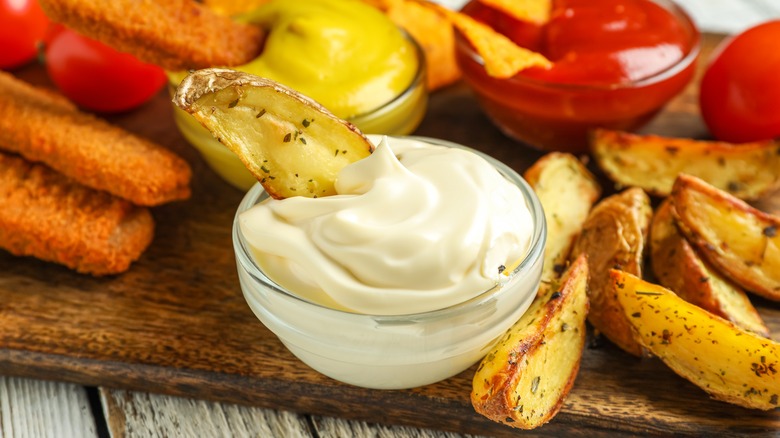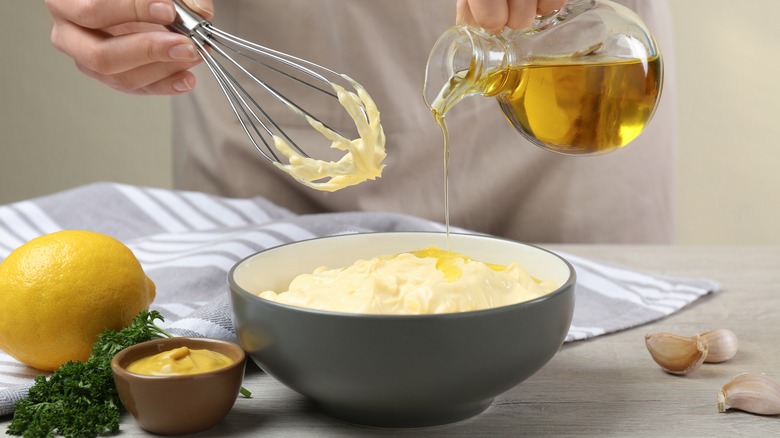The Food Safety Myth To Unlearn About Mayo
It's a bright, hot day at a big summer cookout, and you're waiting in line for a third helping of macaroni salad. Someone mentions how dang hot it is out here and the question of food safety is suddenly churning in your mind. The food's been sitting out for almost an hour and that incredible mac salad is chock-full of mayo. What are the chances you get food poisoning from it? Pretty high, you decide. Mayo and heat are a bad combination. You skip the macaroni salad and grab a second serving of barbecue baby back ribs instead.
If this scenario is familiar, you've fallen prey to one of the biggest food safety myths out there — that mayonnaise is the most likely culprit behind food poisoning at picnics, barbecues, and other outdoor food events. While this may have been accurate in the days before commercially produced mayonnaise, nothing could be further from the truth today. In fact, the mayo in that macaroni salad could make it safer for consumption than it would be in a mayo-less form. Worse, some of the other mayo-free dishes that have graced your Styrofoam plate are more likely to have you calling in sick to work tomorrow than anything with mayonnaise.
How the food safety mayo myth spread
So, why do people believe this myth about mayo? Essentially, it's a vestige from the days when the only mayo you'd find at that cookout was homemade. Most homemade mayonnaise recipes contain raw eggs, which should always be kept at 40 degrees Fahrenheit or a little colder, according to the USDA. Leaving homemade mayonnaise at room temperature, much less out in the heat, dramatically increases the risk of foodborne infection from salmonella and other pathogens. In the past, when people realized the connection between homemade mayo and food poisoning, they (rightfully) started shaking their heads and groaning, "It must have been the mayonnaise," when someone contracted food poisoning after an event. The habit stuck, even when the advent of commercially produced mayo changed its microbe game completely.
The thing is, store-bought mayonnaise is quite different from its homemade counterpart. It's very unlikely to make you sick (unless it's spoiled). For one, it's made with eggs which, though raw, are pasteurized to prevent harmful bacteria. (Store-bought tartar sauce is made with pasteurized mayo, too, in case you were wondering). In addition, the lemon juice and vinegar in store-bought mayo make it too acidic an environment for food-borne pathogens, which it actually kills and prevents from forming. This means it's more a food safety friend rather than a foe, and its presence in that tantalizing macaroni salad or on a chicken sandwich is likely helping to keep pathogens away. So much for blaming the mayo!
Truths about mayo and food safety
Just because store-bought mayo is a pathogen's nightmare doesn't mean it blesses every food it touches. You should still never leave mayo-based foods out at room temperature or higher indefinitely. This is because other ingredients in those dishes – meat, fish, eggs, and the like — could harbor bacteria if not kept properly heated or cooled.
The USDA is clear about the importance of keeping hot food hot and cold food cold, whether it's got mayo in it or not. Cold foods, such as a garden or chicken salad, need to be kept at 40 degrees Fahrenheit or under. Hot foods, like those amazing baby back ribs you snagged at the cookout, need to stay at a temp of 140 degrees Fahrenheit or above. In between those two temps is where bacteria proliferate.
Time is of the essence as much as temperature when it comes to food poisoning. As much as it may pain you to do so, if perishable foods sit out at room temperature for over two hours, you need to toss them. If they've sat out in 90 degree heat, you need to dump them after one hour. Follow these rules, and you're much less likely to wind up with a food poisoning story to tell that will prompt some unknowing soul to ask, "Oh, no! Was it the mayo?"


